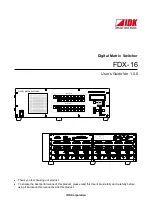
6-13
Catalyst 2975 Switch Software Configuration Guide
OL-19720-02
Chapter 6 Managing Switch Stacks
Understanding Stacks
Incompatible Software and Member Image Upgrades
You can upgrade a switch that has an incompatible software image by using the
archive copy-sw
privileged EXEC command to copy the software image from an existing member. That switch
automatically reloads with the new image and joins the stack as a fully functioning member.
For more information, see the
“Copying an Image File from One Stack Member to Another” section on
Stack Configuration Files
The master has the saved and running configuration files for the stack. All members periodically receive
synchronized copies of the configuration files from the master. If the master becomes unavailable, any
member assuming the role of master has the latest configuration files.
•
System-level (global) configuration settings—such as IP, STP, VLAN, and SNMP settings—that
apply to all members
•
Member interface-specific configuration settings, which are specific for each member
A new, out-of-box switch joining a stack uses the system-level settings of that stack. If a switch is moved
to a different stack, it loses its saved configuration file and uses the system-level configuration of the
new stack.
The interface-specific configuration of each member is associated with its member number. A stack
member keeps its number unless it is manually changed or it is already used by another member in the
same stack.
•
If an interface-specific configuration does not exist for that member number, the member uses its
default interface-specific configuration.
•
If an interface-specific configuration exists for that member number, the member uses the
interface-specific configuration associated with that member number.
If you replace a failed member with an identical model, the replacement member automatically uses the
same interface-specific configuration. You do not need to reconfigure the interface settings. The
replacement switch must have the same member number as the failed switch.
You back up and restore the stack configuration in the same way as you do for a standalone switch
configuration.
For information about
•
The benefits of provisioning a switch stack, see the
“Stack Offline Configuration” section on
.
•
File systems and configuration files, see
Appendix B, “Working with the Cisco IOS File System,
Configuration Files, and Software Images.”
Additional Considerations for System-Wide Configuration on Switch Stacks
•
“Planning and Creating Clusters” chapter in the
Getting Started with Cisco Network Assistant
,
available on Cisco.com
•
“MAC Addresses and Switch Stacks” section on page 7-21
•
“Setting the SDM Template” section on page 8-4
•
“802.1x Authentication and Switch Stacks” section on page 10-11
















































